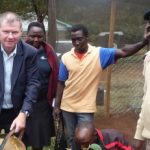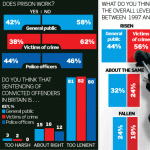We need to ensure that we tackle the current problems within our society head on.
Baroness Stedman Scott (Debbie Scott) is the CEO Tomorrow’s People Trust and an ambassador for Make Justice Work.
“Tomorrow’s People was founded in the early 1980’s by Grand Metropolitan Plc as a result of the inner city riots in Brixton, Toxteth and Bristol. (Grand Met subsequently merged with Guinness to form the international drinks company – Diageo).
Grand Met recognised long before the term Big Society was coined, that there needs to be a partnership approach between the public, corporate and third sectors to support and help those who are marginalised, disenfranchised or who have “lost their way” within our communities. The business was clear that we all need to take responsibility for our society and we can not turn our backs and say “it’s not our problem”.
Unfortunately over the last 30 years we have witnessed further civil unrest on a number of occasions, with the backdrop of unemployment. The rioting, looting and worse that have disturbed our communities in recent weeks can not be condoned, no matter what the individual circumstance; the lawlessness and behaviour of those who took part is absolutely not acceptable, but should we think of this as a wake up call to us all – time for public, corporate and third sectors to say that we can no longer tinker around the edges, but need to openly and honestly confront the underlying issues that cause some people to feel so disengaged and disillusioned that they have no investment in the health of their communities.
The public demand justice, but those of us working on the frontline in disadvantaged communities around the country, know that there is no simple answer and that for many, without effective support, the alternative of prison or a non custodial sentences will not resolve their long term, underlying issues.
We also need to acknowledge that much within our society works, most families, whether dual or single parents work hard to provide a stable environment and we need to take pride in our young people, the majority of whom look to make a positive contribution to their families and communities.
But let’s not waste energy and time playing the blame game – parents, teachers, government, the police, young people, have all been vilified in the press, but we know there are complex reasons why young people in particular, but other groups too, feel alienated from and unwanted by society.
I was fortunate to be Vice Chair of the Social Justice Commission when it was launched by Iain Duncan Smith. A large amount of energy and effort was and continues to be expended on trying to understand why parts of our communities fail. We spent a lot of time taking evidence from a wide range of stakeholders, resulting in a series of reports and recommendations published in two parts under the titles “Breakdown Britain” and “Breakthrough Britain”.
One report – “Dying to Belong” – focussed on gangs and gang culture and I was privileged to meet some inspirational people and grass roots organisations trying to tackle this issue and as a result, making a real difference in their communities.
There has been much robust and valuable research into gangs, so let’s not have another public enquiry, but rather review and re-evaluate the valuable research and solutions already known to us. Let’s learn from positive interventions that are already been tried and tested whether these be in the public, third sector or commercial domains.
Initiatives such as those highlighted in “Dying to Belong” in Merseyside, Strathclyde, Hammersmith and Fulham provide positive options; community based initiatives such as the Eastside Young Leaders Academies, Positive Futures or indeed Tomorrow’s Peoples own youth focused programmes such as In-2 Work, an employment support programme we run in partnership with the Met Police in South London specifically aimed at young people who have been involved in gang related activity.
At Tomorrow’s People we commission independent evaluations of our work. This has found that 74% of young people attending Working It Out, our programme for 16-19 year olds move into employment or training or back to education, with 77% of participants on our gangs project also achieving positive outcomes.
A former drug dealer, who set up his own business after joining In-2 Work, recently commented:
“Ninety nine percent of young people who are doing bad things on these estates don’t want to do it. It’s just that there are no other opportunities.”
We do not purport to have all the solutions, but we work hard to embed ourselves in local communities and we know what works. We must ensure that existing interventions are evaluated, we must learn from the best and scale them, but we need to ensure that investment is based on long term value not just short term costs.
If nothing else comes out of the recent unrest it must be a commitment to invest in our young people, as this will be the foundation for the future. We must not take a top down approach; we need to empower local communities to embed change rather than doing things “to them”.
Tomorrow’s Peopleis a great believer in the “power” of work; it is at the heart of everything we do – we recognise that it gives people dignity, a sense of purpose and self worth and if people have money in their pockets they have choice.
We believe in people’s destiny not their history, but we need to ensure that we tackle the current problems within our society head on and ensure that there is effective and early intervention for young people to prevent further breakdown and to give them hope for the future. However, no one sector can do this alone – there needs to be partnership – now where have we heard that before!”.
Baroness Stedman Scott (Debbie Scott)
CEO Tomorrow’s People Trust.







